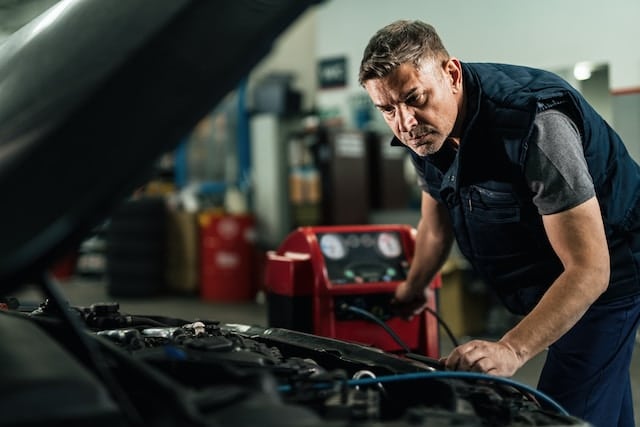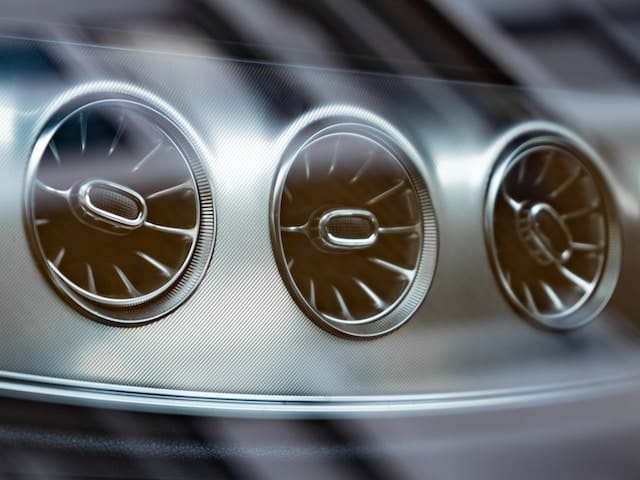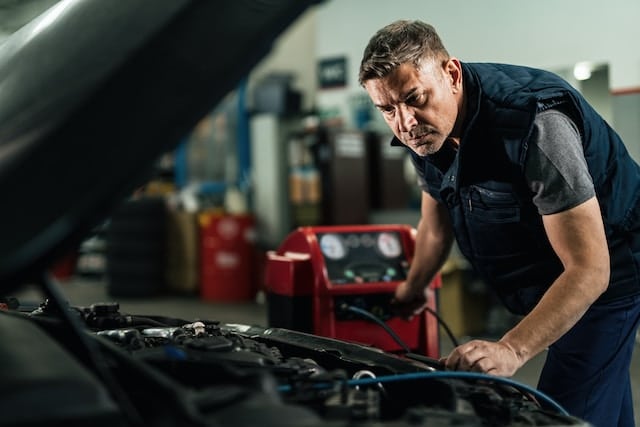
In the face of a “Freon leak car” scenario, it’s crucial to comprehend the signs, the potential impact, and the necessary remedial actions. Freon, a specific type of refrigerant once commonly used in vehicle air conditioning (AC) systems, facilitates the circulation of cool air. When a leak ensues, it not only substantially hinders your AC system’s efficiency but could also pose environmental risks.
Signs of a Freon Leak
[lasso id=”5542″ link_id=”2446″ ref=”amzn-chemours-brand-r134a-refrigerant-freon-for-mvac-use-in-a-12-ounce-self-sealing-container-3-pack” sitestripe=”true”]The most evident sign of a Freon leak is a decrease in your car’s AC system’s cooling efficiency. The air that blows out might be slightly cool initially but quickly becomes warm. Another common indicator is a noticeable hissing or bubbling sound from the AC when it’s turned on, suggesting a substantial leak. In some cases, you may even detect a sweet, chloroform-like smell inside the car when the AC is running.
It’s essential to stay vigilant to potential issues with your vehicle’s air conditioning system. Pay attention to these potential warning signs that may suggest trouble is brewing:
- A noticeable decrease in the coolness of the air being emitted.
- An unusual smell emanating from the air vents.
- An increase in noise coming from the air conditioner’s drive belts, compressor, or blower.
- The emergence of a rhythmic clicking sound from under the hood when you activate the air conditioner or defroster.
- A damp or humid sensation from the AC: If the air emanating from your AC system feels more humid or damp than usual, it might indicate an issue. This could result from a clogged or malfunctioning evaporator, poor refrigerant levels, a faulty AC condenser, or blocked or broken vents
- An ineffective defroster that no longer clears your windshield efficiently.
- The appearance of water on the passenger compartment’s floor.
- The cooling fan continuously switches on and off.
- The air conditioner is blowing warm air instead of cool. This could indicate a lack of sufficient refrigerant.
- The airflow is significantly less than it used to be, even at maximum fan speed. This could suggest a blockage in the ventilation system, such as a clogged cabin air filter.
- Puddles of refrigerant under the car. This could be a sign of a refrigerant leak. The refrigerant is a critical component in cooling the air, and puddles could mean it’s leaking out.
- Unusual vibrations or pulsations when the air conditioning is running could also point to an issue within the system.
Addressing Freon Leaks in Your Car: Possible Repairs and Associated Costs
[lasso id=”5542″ link_id=”2447″ ref=”amzn-chemours-brand-r134a-refrigerant-freon-for-mvac-use-in-a-12-ounce-self-sealing-container-3-pack” sitestripe=”true”]
Once a Freon leak is identified, it’s crucial to act swiftly to prevent further damage. It’s highly recommended to take your vehicle to a professional mechanic who can pinpoint the source of the leak and repair it. In many cases, the fix may involve replacing a damaged hose, seal, or component. Keep in mind that addressing a Freon leak isn’t a DIY job for most car owners due to the complexity of the AC system and the potential hazards associated with handling refrigerants.
In conclusion, addressing a Freon leak in a car is crucial to maintaining optimal performance of your air conditioning system and ensuring a comfortable driving experience. Being vigilant about the symptoms and acting swiftly can save you from more significant issues down the line.
Is It Possible to Repair a Freon Leak?
In most cases, a Freon leak in a car is repairable, providing an effective solution to restore your car’s cooling system to its optimal functionality. However, the feasibility of repair heavily depends on the severity and location of the leak. Minor leaks in accessible locations, such as in hoses or connectors, can often be repaired by a professional mechanic with relative ease.
That being said, there are instances where repair may not be the most viable or cost-effective option. Leaks that occur within the compressor or evaporator can be particularly challenging due to their complex and often hard-to-reach locations. Similarly, if the leak is too large or if there are multiple leaks, the repair costs might exceed the cost of replacing the entire system. It’s essential to have a professional inspection to assess the nature of the leak and discuss the best course of action.
Addressing a Freon leak involves detection, repair, and refill. An AC system inspection by a professional is recommended to identify the source of the leak, often done using UV dye or an electronic leak detector. The repair process then involves replacing or repairing the faulty component. Finally, the system is refilled with the correct amount of refrigerant.
Transitioning Refrigerants: From R-134a to R-1234yf
Three decades ago, the R-22 refrigerant, also known as Freon, was a widely used industry standard. However, when it was discovered to be a significant contributor to ozone layer depletion, R-134a came into the picture as an alternative. As R-134a doesn’t contribute to ozone depletion, it seemed like a solution had been found. But as time passed, new concerns arose. R-134a was found to be a potent greenhouse gas, contributing to global warming. This realization initiated a quest for a refrigerant that is not only ozone-friendly but also doesn’t contribute to global warming.
R-1234yf: The Solution to Environmental Concerns
The answer came in the form of R-1234yf. It proved to be a solution to both environmental concerns, having a negligible impact on the ozone layer and a significantly lower global warming potential. Another advantage of R-1234yf is that the overall design and operation of air conditioning systems that use this refrigerant remain largely the same as those using R-134a. There are a few minor component modifications, such as changes in thermal expansion valves and condensers, but the transition should be relatively seamless for those who work on A/C systems.
Reflecting the shift towards environmental sustainability, the United States Environmental Protection Agency, as of January 1, 2021, , all newly manufactured passenger cars and light-duty trucks must use R-1234yf as their HVAC system refrigerant. Many vehicle manufacturers, however, had already started this transition much earlier.
Choosing the Right Refrigerant for Your Vehicle
When it comes to choosing a refrigerant for your vehicle, it’s crucial to follow the manufacturer’s guidelines. Using an inappropriate refrigerant can negatively impact your vehicle’s performance. Usually, there’s a label or sticker under your car’s hood indicating the type of refrigerant used, whether it’s R-134a or R-1234yf. In case your car doesn’t have this, seeking professional assistance is recommended to ensure the longevity and efficiency of your vehicle’s HVAC system.
Vehicles built before 1992
If you own a vehicle built before 1992 and encounter an air conditioner malfunction, finding a supply of Freon for a refill may prove challenging. In such cases, you have a few options: continue without air conditioning, have your air conditioner retrofitted to accommodate R-134a, or consider upgrading to a newer vehicle.
To determine the costs associated with converting your vehicle’s air conditioning system from Freon to R-134a, it’s advisable to consult with the auto manufacturer, an authorized dealership, or a reputable service facility. For further guidance, you can also reach out to the EPA Stratospheric Ozone Hotline at 800-296-1996.
Understanding the Costs of Repairing a Freon Leak
[lasso id=”5542″ link_id=”2448″ ref=”amzn-chemours-brand-r134a-refrigerant-freon-for-mvac-use-in-a-12-ounce-self-sealing-container-3-pack” sitestripe=”true”]The cost to repair a Freon leak in your car can vary widely, primarily based on the complexity of the repair and the specific components that need attention. Minor repairs, such as sealing small leaks or replacing accessible parts like O-rings or hoses, can be relatively inexpensive, ranging from $100 to $400.
However, if the leak is in a more complex component such as the compressor or the evaporator, the cost can rise significantly. In these cases, repair costs can go well into the $1000 mark or higher. Always consult with a trusted mechanic or service center for an accurate quote tailored to your vehicle’s specific needs.
It’s important to remember that while these costs may seem high, neglecting a Freon leak can lead to more substantial damage over time, escalating repair costs, and reducing the overall efficiency of your vehicle’s air conditioning system. Early detection and repair are crucial to maintaining your car’s performance and comfort.
Navigating the Freon (R-22 or HCFC-22) Ban: Implications and Options for Old Vehicle Owners
The U.S. Environmental Protection Agency’s ban on Freon (R-22 or HCFC-22), implemented on January 1, 2020, has had significant implications for owners of older vehicles. This regulation means that Freon can no longer be produced within the United States or imported into the country. While this may seem to be a formidable obstacle for those who have vehicles that depend on this particular refrigerant for their air conditioning systems, it’s crucial to remember that there are viable options and alternatives available. In this article, we will delve into these possible courses of action, explaining how to navigate this regulatory landscape while maintaining the performance and comfort of your vehicle.
For vehicles manufactured before 1992, obtaining Freon for air conditioning system maintenance or repair may pose a challenge due to its phased-out production. Converting to the alternative refrigerant, R-134a, can be costly. Therefore, it’s crucial to consider these potential expenses when buying a pre-1992 used vehicle or contemplating substantial repairs on an older car you own. In some cases, the cost of overhauling the air conditioning system may exceed the vehicle’s value.
The EPA’s ban on Freon (R-22 or HCFC-22) indeed has significant implications for owners of older vehicles that still use this refrigerant in their air conditioning systems. Essentially, these owners have a few potential courses of action:
Continue using existing R-22 supplies
Since the ban prohibits the production and importation of new R-22, not the sale and use of existing supplies, it is still legal to use remaining stocks of R-22. However, as these supplies continue to deplete, the cost of R-22 is likely to increase substantially due to scarcity.
Use reclaimed or recycled R-22
R-22 that has been reclaimed (purified to a standard suitable for reuse) or recycled (extracted and cleaned for reuse without being purified to the same standard as reclaimed refrigerant) from other systems is still available for use. However, the availability of reclaimed or recycled R-22 will also decrease over time.
Convert the system to use an alternative refrigerant
There are several refrigerants available on the market that are approved by the EPA as alternatives to R-22, such as R-134a and R-1234yf. These refrigerants do not deplete the ozone layer and have lower global warming potential than R-22. However, converting an air conditioning system to use an alternative refrigerant can be a complicated process that often involves replacing several components of the system and should be performed by a certified technician.
Replace the vehicle or the air conditioning system
In some cases, it may be more cost-effective in the long term to replace the entire vehicle or the air conditioning system with a newer model that uses an environmentally friendly refrigerant.
In all cases, owners of vehicles with air conditioning systems that use R-22 should consult with a professional mechanic or air conditioning technician to understand their options and choose the best course of action based on their specific circumstances.
What is Freon?
Freon is a brand name that’s owned by the Chemours Company, which is a spin-off of the chemical giant DuPont. While it has become a generic term for any refrigerant, it’s technically incorrect to use it that way.
The name “Freon” has been associated with various types of refrigerants over the years, including the now banned R-22, but also other types such as R-12 and R-134a, among others. All of these are different chemicals with different properties, but they have been used in similar ways as refrigerants in air conditioning and refrigeration systems.
Modern cars can still use refrigerants that are branded as “Freon,” but they’re not the ozone-depleting R-22 variety. Most modern vehicles use a refrigerant known as R-134a or its more recent alternative R-1234yf, both of which are legally permissible. It’s essential to check your car’s specifications or consult a professional when servicing your vehicle’s air conditioning system to ensure you’re using the correct type of refrigerant. Always remember that while the name “Freon” is often used generically to refer to refrigerants, it’s technically a brand name that includes a variety of different refrigerant types.
The confusion often arises because when people say “Freon”, they may be referring to R-22 (a type of HCFC), but they could also be referring to any other type of refrigerant. However, in the context of regulations and environmental concerns, “Freon” is most commonly associated with R-22, which is known to deplete the ozone layer and has been phased out by the EPA in the United States.
It’s also worth noting that while the production and import of R-22 have been phased out, Chemours and other companies continue to produce other types of refrigerants under the Freon brand that comply with current environmental regulations.
So, Freon can refer to other products that are not banned. However, it’s essential to specify the type of Freon (i.e., the specific refrigerant type) to avoid confusion. When people talk about the “Freon ban”, they’re typically referring to the phase-out of R-22.
As of 2020, production and import of Freon (R-22 or HCFC-22) have been phased out in the United States due to its harmful effects on the ozone layer. This development is significant for owners of older vehicles that still use this particular refrigerant. While the production of Freon has been halted, its use is not illegal, and existing supplies can still be used.
However, the availability of R-22 is increasingly limited, and only recovered, recycled, or reclaimed supplies are available. Consequently, this regulatory change has added another layer of complexity to addressing a Freon leak in your car. This article aims to provide knowledge about identifying a Freon leak, understanding its implications in the light of recent regulations, and outlining the appropriate measures for resolving the issue.
Preventing Future Freon Leaks
To avoid future Freon leaks, regular servicing and inspection of your car’s AC system are essential. Most manufacturers recommend an AC service every year or every two years, which includes a check for leaks and refrigerant refill if necessary.
In conclusion, a Freon leak in your car is a serious issue that should not be ignored. Not only does it affect your driving comfort, but it also poses environmental and health risks. Ensuring timely recognition, repair, and prevention is the key to maintaining a well-functioning, efficient, and eco-friendly vehicle.
FAQs: Freon Leak Car
[lasso id=”5542″ link_id=”2449″ ref=”amzn-chemours-brand-r134a-refrigerant-freon-for-mvac-use-in-a-12-ounce-self-sealing-container-3-pack” sitestripe=”true”]How much does it cost to repair a Freon leak in a car?
Repairing a Freon leak can cost between $200 and $1,500, depending on the severity of the leak, the parts that need replacing, and the labor costs. However, with the decreased availability of Freon, the cost could potentially be higher.
What are the signs that my car has a Freon leak?
Some signs of a Freon leak include your AC not cooling as efficiently as it used to, the presence of a strange smell coming from the vents, an unusual noise coming from the AC components, or the presence of a refrigerant stain under your vehicle.
What does a Freon leak mean for my vehicle’s performance?
A Freon leak can lead to reduced cooling efficiency, making for an uncomfortable driving experience, especially in hot weather. If left unchecked, it can cause damage to your air conditioning system, resulting in costly repairs or replacements.
How can I address a Freon leak in my car?
Once you suspect a Freon leak, it’s advisable to take your vehicle to a professional mechanic who can diagnose the problem accurately and repair it. The fix may involve replacing a damaged hose, seal, or component.
Can I handle a Freon leak myself?
Due to the complexity of the AC system and potential hazards associated with handling refrigerants, addressing a Freon leak isn’t typically a DIY job. It’s safer and more effective to seek professional help.
What types of Freon are used in modern cars?
Modern vehicles generally use R-134a or R-1234yf as the refrigerant in their air conditioning systems. These are legal and environmentally friendly alternatives to the phased-out R-22.
How often should I have my vehicle’s AC system checked for Freon leaks?
While there’s no fixed schedule, it’s a good practice to have your AC system inspected annually, or immediately if you notice any signs of a leak or reduced cooling efficiency.
Why was Freon R-22 or HCFC-22 banned in 2020?
Freon, also known as R-22 or HCFC-22, was banned because of its harmful effects on the ozone layer. The United States Environmental Protection Agency (EPA) implemented this ban on the production and import of this specific refrigerant starting from January 1, 2020.
I own an older vehicle that uses Freon in its AC system. Is it illegal to use it after the 2020 ban?
No, it’s not illegal to use Freon in your vehicle’s AC system. The 2020 ban only applies to the production and import of R-22, not its use. However, given the decreasing availability of this refrigerant, finding a supply may become increasingly difficult and expensive.
What can I do if my older vehicle has a Freon leak?
If your older vehicle that uses Freon has a refrigerant leak, it’s advisable to have it professionally inspected and repaired. Depending on the severity of the leak, it might be more practical and environmentally friendly to convert your AC system to use a more modern, acceptable refrigerant like R-134a.
Is it possible to convert my older vehicle’s AC system to use a different refrigerant?
Yes, it’s possible to convert an older vehicle’s AC system to use a different refrigerant like R-134a or R-1234yf. However, such conversions should be done by a professional to ensure compatibility and safety. The conversion cost can range from $200 to $800, depending on the make and model of your vehicle.


